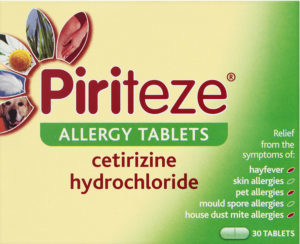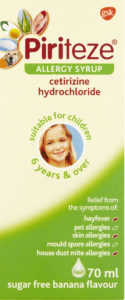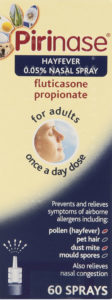Stop Hay Fever In Its Tracks!

More than 10 million Brits suffer from hay fever every year, making it one of the most common allergies in the UK. Severity of symptoms varies according to pollen count and weather, and the time of year your symptoms begin depends on the type of pollen you’re allergic to – keep an eye on the pollen forecast to make sure you’re ready to stop the sniffles.
To ease common symptoms, such as itchy eyes, a runny nose and sneezing, Well’s expert pharmacists have provided their top 5 pollen-fighting tips to keep a spring in your step!
1 Keep your windows and doors closed as much as you can
The pollen count is at its highest first thing in the morning and last thing at night, so make sure you don’t sleep with your windows open. If you need some cooler air when the pollen count is high, try using an oscillating electric fan.
2 Don’t leave your washing to dry outside
This is especially important for bedding! Leaving it to dry outside may be more economical but it quickly becomes covered with pollen naturally scattered in the breeze. With pollen on your clothes, towels and bed linen, there’ll be no respite for your skin or senses, so play it safe and hang washing indoors whenever possible.
3 Wear sunglasses outdoors
Sunglasses aren’t just for keeping the rays at bay (or for channelling your inner rock star), they’re also a handy visor against wind which naturally distributes pollen. Combine this with a recommended anti-allergen product to keep irritation to a minimum.
4 Wash your hands, wash your hands, and wash your hands again!
We’ve all experienced the pain of accidentally touching your eyes after cooking with chilli – ouch. Well, for hay fever sufferers, touching your face or rubbing your eyes can start a tirade of tears in the same way. Pollen gets onto everything during spring thanks to its distribution by the weather and insects, so make sure you wash your hands regularly to avoid transferring that pollen to your eyes and nose.
5 Be prepared
There are a whole host of anti-allergen medicines and products available at your local pharmacy. It can be difficult to figure out which one will work best for you so here are our best picks to keep close at hand when the sun comes out to play…
For occasional flare-ups
Piriteze Allergy Tablets – currently 2 for £6 at your local Well Pharmacy
If hay fever bothers you but isn’t a constant and daily irritant, it’s best to keep a box of Piriteze allergy tablets in your pocket in case any symptoms flare up. The tablets contain non-sedating antihistamine, which means you’ll be protected against the allergy without feeling drowsy, allowing you to happily carry on with your day.
For the serious sufferer
Piriteze Allergy Tablets One-a-Day – currently 2 for £12 at your local Well Pharmacy
For those of you who really suffer from hay fever and it negatively impacts your quality of life, it’s best to start the battle against pollen first thing. Try Piriteze One-a-Day allergy tablets to make sure you’re protected before you step out of the house.
For the tablet-haters
Piriteze Allergy Syrup One-a-Day – currently 2 for £6 at your local Well Pharmacy
The One-a-Day Allergen Syrup from Piriteze is the best option for those who regularly experience the effects of hay fever, but don’t like taking tablets. The syrup is an easy way to get the anti-allergen fighting medicines into your body so you’re ready for that summer picnic or outdoor run.
For sinus problems
Pirinase Hayfever Nasal Spray, 60 Spray – currently 2 for £12 at your local Well Pharmacy
If hay fever affects your sinuses, then Pirinase Hayfever Nasal Spray is a must for your pocket. Used regularly, this handy spray is likely to be your best option for keeping symptoms under control. The spray contains the right steroids to help ease itchy, watering eyes and a blocked nose.
Need More Advice?
If you’d like more advice on the best products to help you enjoy life during the pollen season, then your local Well pharmacist is available to discuss the right treatment for you. http://www.well.co.uk/Pharmacy-Finder/
To check the pollen forecast, available from March: http://www.metoffice.gov.uk/health/public/pollen-forecast







